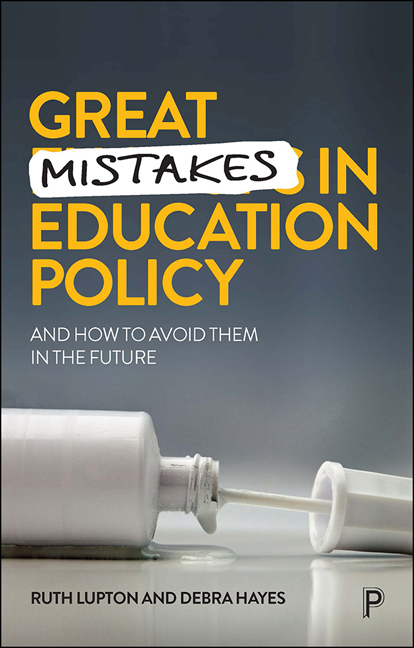Book contents
- Frontmatter
- Contents
- List of tables and boxes
- List of abbreviations
- Notes on the authors
- Acknowledgements
- 1 Introduction
- 2 Setting the scene
- 3 Tests, tests, tests
- 4 Schooling that works for some but not for others
- 5 Teachers making less of a difference
- 6 Mistake #1: turning to the market
- 7 Mistake #2: letting test scores drive policy
- 8 Mistake #3: over-prescribing teachers’ work
- 9 Mistake #4: misunderstanding educational inequalities
- 10 Mistake #5: leaving education out of education policy making
- 11 Synthetic phonics: a ‘perfect storm’ of policy mistakes
- 12 There are alternatives
- References
- Index
5 - Teachers making less of a difference
Published online by Cambridge University Press: 23 December 2021
- Frontmatter
- Contents
- List of tables and boxes
- List of abbreviations
- Notes on the authors
- Acknowledgements
- 1 Introduction
- 2 Setting the scene
- 3 Tests, tests, tests
- 4 Schooling that works for some but not for others
- 5 Teachers making less of a difference
- 6 Mistake #1: turning to the market
- 7 Mistake #2: letting test scores drive policy
- 8 Mistake #3: over-prescribing teachers’ work
- 9 Mistake #4: misunderstanding educational inequalities
- 10 Mistake #5: leaving education out of education policy making
- 11 Synthetic phonics: a ‘perfect storm’ of policy mistakes
- 12 There are alternatives
- References
- Index
Summary
Many teachers say they joined the profession to make a difference, perhaps because they themselves experienced the transformative influence of a good teacher or tried their hand at a less fulfilling occupation. Whatever the reason, making a difference in the lives of young people is widely valued as a reason for joining and staying in a challenging profession. Take, for example, Belinda Lyons-Lee (2019), who took a year off teaching and became a published author. Despite the fewer demands and less pressure of her writing career, she returned to teaching because ‘I needed to reconnect with my passion of introducing these teenagers to the power of a narrative to change a life and then introduce them to the skills so they could write their own powerful narrative that would change lives’ (Lyons-Lee, 2019).
One of the most important functions of schooling is to help each young person to develop the narrative of their life, even when there are interruptions and when they face barriers beyond their control. Teachers’ work fundamentally affects young people's experiences of schooling, but more than this it affects the likelihood that they will enjoy and succeed not only at school, but also in life.
In this chapter, we argue that in England and Australia, teachers are making less of a difference than they could, because of the ways in which their work is changing. Instead of concentrating their efforts on teaching, and on reviewing and developing their pedagogical practice, they are burdened by administrative demands associated with monitoring and demonstrating the performance of their students. These activities are described by a teacher in Comber and Nixon's (2009) study as ‘meaningless bullshit destined for a cupboard in someone's office’ (p 339). Within the classroom too, their teaching is increasingly prescribed, following a script or formula. In Chapter 3, we showed how ‘teaching to the test’ is making for a narrowing of learning opportunities for students. Here we unpack that further. Drawing on large-scale surveys of teachers conducted in England, Australia and across the globe, as well as in-depth studies of schools and classrooms, we relate teachers’ widespread concerns with forced over-compliance, superficial regulations and the erosion of professional autonomy. We show how the practices associated with increasing accountability are constraining teachers’ pedagogical repertoires and skills, diminishing trust in the teaching profession and, ultimately, making teaching and school leadership a job that fewer people want to do.
- Type
- Chapter
- Information
- Great Mistakes in Education PolicyAnd How to Avoid Them in the Future, pp. 55 - 66Publisher: Bristol University PressPrint publication year: 2021



